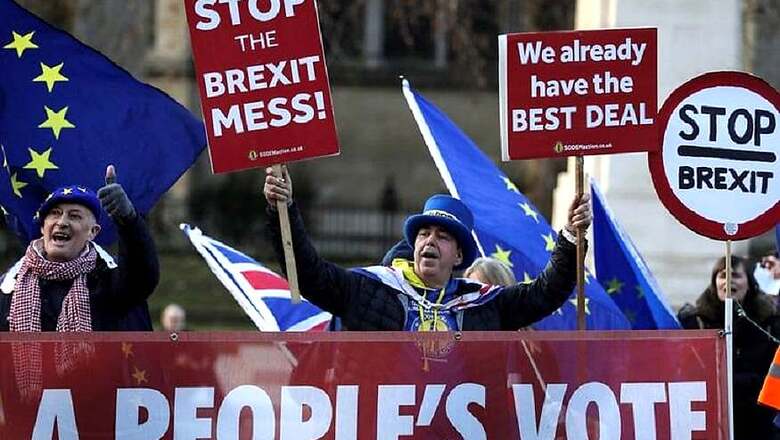
views
Brussels: Brexit paralysis has prompted talk of a British election or a second referendum but one odd side-effect could be Britons having to cast their votes for an EU parliament they had decided to leave.
Britain is scheduled to quit the European Union on March 29, two months before citizens of the other 27 EU states elect a new European Parliament.
But with Prime Minister Theresa May looking unlikely to win British parliamentary backing next week for her EU withdrawal treaty, speculation is mounting that London will try to delay departure, creating a legal headache for Brussels.
"We are looking into what this might mean, but there is very little that is clear, legally, and it depends on what Britain decides to do," one senior EU official said, describing growing discussion of the issue around Brussels and in EU member states.
Key complications are:
- how long an extension Britain may seek to its two-year exit deadline under Article 50 of the EU treaty -- notably whether it leaves before or after the current EU legislature lapses on July 1
- whether an extension might end up cancelling Brexit altogether
- whether a need for Britons to vote for new EU representatives could be delayed beyond May
- whether the new EU chamber will need to ratify the Brexit terms.
"It's being discussed informally. There's not been any formal proposal and indeed a proposal would have to be kicked off by the UK government, at some juncture," said Richard Corbett, a leading British Labour Member of the European Parliament (MEP).
A European affairs minister from an EU government said the prospect of Britons having to hold a vote in late May to elect MEPs to a chamber they were still about to leave would be "mad politically, but legally we might have no other option".
A second EU official said Britain had told the EU it had budgeted for an election that, without Brexit, would have been scheduled for Thursday, May 23.
Asked about such plans, Britain's Electoral Commission said it had no plan for an election but it was "experienced in delivering well run, unscheduled elections and can draw upon this expertise as required".
SCENARIOS
There are several scenarios for how a delay to Brexit could play into the EU elections, which are shaping into a showdown between eurosceptic nationalists and more mainstream parties:
- An extension of Britain's EU membership of six weeks or so to allow for loose ends to be tidied up if May eventually wins parliamentary backing. That would have little impact as Britain would be out before European Parliament elections.
- An extension of three months to end-June could also have limited impact, as the existing EU parliament would be within its five-year mandate and could ratify the Brexit treaty.
- From July 2, any EU decision must be ratified by the new parliament elected on May 23-26. If Britain is still formally a member and has not returned its MEPs, there could be legal challenges to the validity of any agreement.
- That could strengthen arguments for Britons to go to the polls anyway on May 23 to elect MEPs -- though there could then be questions over the role of those MEPs in any vote on Brexit.
- Britain could hold a "catch up" election for MEPs later, if for example if it used the extension to hold a second referendum that might revoke the Article 50 notification and scrap Brexit.
- Some officials also note a mechanism whereby new member states send representatives from their national parliament to the EU legislature until they have held a direct EU election; but applying that to an existing member state is problematic.
- Adding to the problems, the EU already handed some of Britain's seat allocation to other countries -- but that change will be put on hold until after Brexit, leaving some states such as France unsure how many MEPs they may actually be electing.
The confusion could have a serious impact on EU business by delaying a timetable for choosing a new EU executive and setting a new legislative programme, including a new seven-year budget.
Officials say President Jean-Claude Juncker and his European Commission expect to have to stay in office beyond their end-October mandate even if Brexit goes smoothly, due to likely wrangling with eurosceptics in the new parliament and among national leaders over who should replace Juncker and his team.



















Comments
0 comment